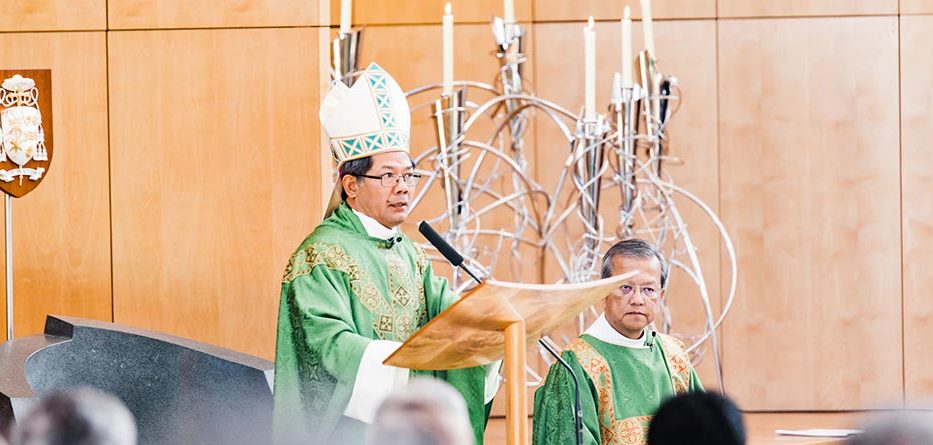Most Reverend Vincent Long Van Nguyen OFM Conv DD STL, Bishop of Parramatta
Homily for the 21st Sunday in Ordinary Time in Year A at St Patrick’s Cathedral, Parramatta
27 August 2017
Brothers and Sisters in Christ,
This Sunday, the Church in Australia observes Migrant and Refugee Sunday. Here, we are blessed with the presence of many migrants and refugees, making it one of the most diverse and multicultural dioceses anywhere in the world. It is for this reason perhaps that Pope Francis appointed me, the first former refugee bishop to lead a diocese in Australia. I feel that it is my privilege and my duty to be the voice of migrants and refugees. In fact, Pope Francis in his message for this Sunday invites us all – and not just a leader like me – to be the voice for the vulnerable and the voiceless.
His message echoes the constant call of the Gospel, which challenges us to go beyond our comfort zone and engage with those who are on the outer ring of our circle of life. Our very journey to God is invariably linked to a missionary journey towards our brothers and sisters, especially those alienated, discriminated, ostracised, wounded, broken and in need of recognition, acceptance, inclusion and love.
Scriptures for this 21st Sunday exhort us to make the care for the vulnerable and the discipleship of self-giving the foundation or the bedrock of our Christian lives. Isaiah in the first reading denounces Shebna because he has failed to use his position as the King’s treasurer to care for the people. In his place, Eliakim was to be chosen to be “the father to the inhabitants of Jerusalem and the House of Judah”. This prophecy is messianic in that Eliakim was a figure of the ideal ruler who would bring God’s true justice, love and compassion to the people.
The Gospel tells us of the profession of faith by Peter at a crucial point in their journey towards Jerusalem. After surveying the opinion polls about him, Jesus asks the same question of his disciples: “Who do you say that I am?” It is to this question that Peter gives the answer: “You are the Christ, the Son of the living God”. What follows is an unexpected lesson for Peter and the other disciples.
Peter is praised for recognising the Messiah. He is called the rock. However, the rock can be either the corner stone or the stumbling block. So long as Peter lives out the call to emulate the Suffering Servant, he is the rock of strength. But if he refuses to be part of Christ’s suffering, he becomes the rock of offense. Indeed, Peter is soon rebuked and called a stumbling block precisely because he wants to remove the cross from the mission of the Christ and Christian discipleship.
Peter has a steep learning curve on his way to be the foundation stone for the Christian community. Like Paul falling from his high horse, Peter also has his pride and ambition checked. He learns to carry the cross as a discipleship of trust, powerlessness, vulnerability and self-sacrifice. He learns to be led to places he’d rather not go. This is not simply geography but above all a metaphor for vulnerable trust which is an essential quality for Christian living and witness.
Dear friends,
In many ways, the Church today is being led to places that we’d rather not go. I am not only referring to the crisis of diminishment in terms of vocations to the priesthood, religious life or worshippers in the pews. There is also a sense of diminishment in terms of the Church’s moral stature in society.
From where I stand, there is precious little ‘trust capital’ left in the Church leaders after the Royal Commission. Yet, it is not time for defensiveness or despair. Rather, it is precisely in this time of humility that we must seek to rebuild, renew and reimagine. We do so by reclaiming not the former prestige and affluence, but the essential quality for Christian living and witness. We simply must make the cross of Christ and the discipleship of powerlessness and vulnerable trust the cornerstone of the Church again. Only by standing on the side of the powerless and the vulnerable, only by living authentically the call to poverty, simplicity and humility can our voice be credible and our trust regained.
It seems to me that the invitation to go to places that we’d rather not go is none other than the call to emulate the humble, powerless and vulnerable Christ. It is the call to live more fully, more boldly and more humbly at the periphery. This has been Pope Francis’ constant challenge to the Church. The pope wants us to go to the margins, to stay close to those on the edges of life and to be that Church which is bruised, hurting and soiled because it has been out on the streets and immersed in the coalface realities. It is the Church that dares to do what Jesus did: to accompany the most vulnerable, to empower them to live more fully, or in the words of Paul today, to experience the depths of God’s love.
As Christians, we cannot remain content with status quo. Australia is a wonderful country but where it is in terms of its treatment of the most vulnerable such as the homeless, the asylum seekers, the indigenous peoples etc… should galvernise us into action. We cannot be his disciples if we ignore the plight of the marginalised and the voiceless. We cannot be salt and leaven if we allow our Christian conscience to be desensitised by the inequality, injustice and inhumanity in our society and in the world.
May our endeavour to replace the culture of fear and indifference with that of encounter and acceptance be brought to fulfillment in accordance with God’s vision of the fullness of life for all humanity.








